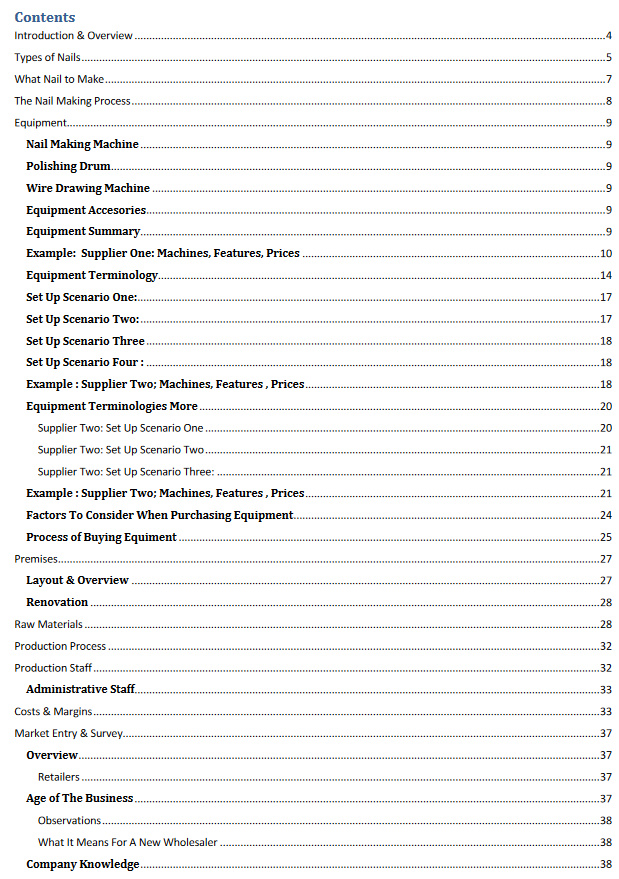Nails Making Business Plan
Nails Making Business Plan

Nails Making Business Plan Overview
This Nails Making Business Plan focuses on making nails. Nails as used in construction, carpentry or other industry where fastening is required.
Nail manufacturers in Kenya can be loosely classified as:
- Large Manufacturers – These dominate the steel industry. In addition to nails they manufacture a range of items like steel bars and iron sheets. These include the likes of Devki and Tuffsteel.
- Mid Level Companies – These either manufacture nails at a relatively smaller scale or import nails from countries such as India or China. These include Kifaru Enterprises, Jubilee Jumbo Hardware and a host of other independent importers.
- Small Scale Manufacturers – These manufacture nails at a comparatively small scale. Think of them as a sort of cottage industry some operating from home. Because of their scale and the fact that they get their raw materials from the bigger steel companies their costs are relatively high. Some could struggle to price in the same range as the large and mid level companies. Hence they will often sell directly to retail hardware shops or contractors. These are the focus of this Nails Making Business Plan.
Related to the small scale manufactures are also small scale independent importers. These too import nails and distribute at a small scale level. Often importers specialize in one or several types of nails. Presently roofing nails are some of the most imported.
For years nail manufacturing was dominated by the large highly capitalized manufacturers. This was mainly because of the then barriers in entry in terms of the cost of machinery, raw materials and skill.
However that has now changed. A thriving cottage industry in manufacture is emerging. This has largely been triggered by the availability of affordable nail making machines. In the market now are machines starting at Kshs.500, 000; an amount which a significant number of entrepreneurs can afford.
Gradually steel companies are opening up to supply raw materials to the cottage industry and although this is still partially a challenge it’s no longer a total hindrance. Most of the machinery present in the market does not require steep learning curves, thus technical knowledge is not much of a problem.
A big percentage of nails are used in the construction industry. And if the construction industry is growing then it means that the demand for nails will also increase. That has been the case in the last ten or so years. The higher demand means that there are greater chances of a nail making business succeeding since the market has been big enough to sustain new entrants. And although the construction industry has slowed down a little bit it’s not to the level that the demand for nails has considerably gone down.
The growth of small and medium scale nail making business has also been contributed by the increase in the number of hardware stores. Hardware shops are now some of the most ubiquitous; found in every corner and in all sizes. This has eased the headache of distribution. With so many hardware shops there is a chance of a number of them stocking your product?
Another factor that has encouraged the growth of the cottage nail making business is the low brand loyalty among nail consumers. Often consumers will ask for “nails” rather than EFG company’s nails. Thus as much as there is some level of brand loyalty it’s not so entrenched. This makes it easier for new manufactures to gain a foot in the market. This will become clear in the course of this Nails Making Business Plan.
As much all the above factors are in favour of a nail making business success is not automatic. Realities in the market you are targeting matter and so does your skill in managing the business. Competition in the business is also increasing at all levels and especially from the importers. Still opportunity exists in the business but requires good strategy to seize.
Download Nails Making Business Plan / guide here